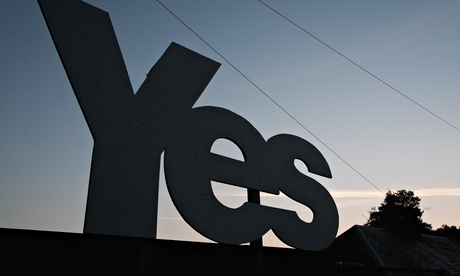
Why are so many Scottish writers keen on an independent Scotland? Why are so many writing and talking about what a Yes vote will mean to them over the years to come?
I can only think it’s because it’s an exciting and creative thing to do – to imagine a new kind of country with new opportunities and ideas about identity. It’s like starting a new book, having a clean page … As though all the ideals and hopes one might have for a literary project could be writ large in the planning of a country’s future.
Surely it can’t be that any of them believe that their literary lives will change at all? It can’t be that they don’t want their work to be published and reviewed in territories outside Scotland, or that they would want to see a Scottish readership prioritised over a national one in the way that the SNP want to give the Scottish vote this month only to those who live permanently inside Scotland now?
Or that they want their work seen as being outside the British canon in the way books from countries independent of the UK are seen – as American or Colonial or European or otherwise “other”? To be writing a literature that is inherently disconnected from rather than, complicatedly and interestingly, part of Englishness, Irishness, Welshness? It surely can’t be, either, that they think their work isn’t taken seriously enough outside Scotland and want a fresh definition of status and worth - not when the Scottish literary novel has been so long at home in the Bloomsbury drawing room that it’s a wonder the novels of the English south west or north east don’t rise up in protest at the door.
Maybe those writers who talk and write a lot about an independent Scotland have always been engaged with themes of nationhood and imperialism. (Or at least as keen on those themes as any others.) And as the theorists have taught us, when all language is political, how could someone interested in words not be interested in power too? How can you strip story from society, or dissociate the personal from the public? Especially now, especially in Scotland. Maybe it’s just the case that all writing from Scottish writers is bound to be referendum-minded, and no matter how little one may believe in so-called democracy in an age of rampant capitalism, , just writing that sentence is proof of one’s engagement in the political game. Even by not writing about the referendum, one writes about it - see?
But all of this is one kind of writing – that is connected to the times, the trends, the fashions, the world. What about the other kind, that’s done by the artist who sits outside society? Who wills herself or himself to be apart, no matter how hard the pull of controversy or opinion? Isn’t the artist the one who has no agenda other than the work in hand which is forged from the abstract, the amoral, the unconditional? What of the kind of sensibility, I wonder, that has no dealings with concepts of “Nation” and is interested only in aesthetics, in language as the plastic stuff of form? “The National is the Parochial” wrote the great Scottish poet Tom Leonard in a banner-style verse that appeared in a recent anthology of Scottish Writing on the referendum, Unstated, showing how shifty words can be – a simple statement dressed up as something which, although it looked like a political poster on the page, was in fact the very opposite of a patriotic rallying cry. And this from one who has made Scottish language his subject: here’s the writer as artist indeed.
And I do wonder if, even if some of those who have been writing about independence don’t view themselves as that kind of writer – the “artist”: what kind of a fancy notion is that? – but are more in the traditional mould of, say, the novelist who may hold his mirror up to society or the poet who makes timely responses to the times, still, however they define themselves, have any of them fully imagined, in the midst of all the imagining of a new Scotland, how much time it is going to take up, this fashioning of a brand-new world? How much content it will absorb – of stanzas or chapters, short stories or epics – the project of defining a nation? As art historian Murdo MacDonald put it recently, at a literary and arts event at the Royal Society of Edinburgh, “It’s not so much a question of whether our culture is Scottish as whether it’s Scottish enough.”
In New Zealand, they took on the idea of letting writers define a culture that’s independent from the UK long before Alex Salmond came to the fore. Since the 1950s, it’s been a national project to put as much space as possible between there and here – between writers as separate in time and worldview as Katherine Mansfield and Witi Ihimaera – to the point where, as the NZ poet laureate and distinguished scholar Vincent O’Sullivan wrote in a recent short story. “When their lattes were brought to them, with fern leaves patterned in the cream, Mary said … ‘I can t stand this way we have to play at being Kiwis all the time.’ ”
Because national projects. Well, they’re for nations. And although maybe some writers like that idea, of having a role in the development of a country – a job even – so that instead of writing what they might have, they go on to embrace a whole kind of political agenda in their work, is it really how we want to imagine the future of Scottish writing?
• Kirsty Gunn’s latest novel is The Big Music.

